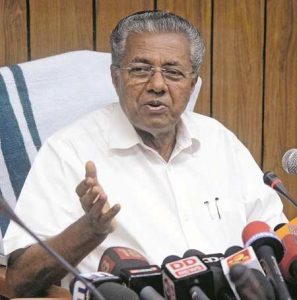
The reinstatement of TP Senkumar by the apex court has come as a major embarrassment to the Left Front government and Chief Minister Pinarayi Vijayan
~Naveen Nair in Thiruvananthapuram
In a major embarrassment to the Kerala government, the Supreme Court asked it to reinstate its DGP, TP Senkumar, who had been replaced by Loknath Behra. Senkumar had waged a year-long battle with the state government and now feels vindicated.
On April 24, a Supreme Court bench of Justices MB Lokur and Deepak Gupta said: “The removal or displacement or transfer out of an officer from a sensitive tenure post requires serious consideration and good reasons that can be tested so that the officer is not dealt with as a pawn in a game.” This verdict has set a benchmark and proved that honest officers can hope to be protected from transfers and removals based on the whims and fancies of the government of the day.
LANDMARK CASE
A beaming Senkumar told India Legal: “This judgment vindicates the stand that I had taken but it is also a judgment for future generations. This can now be used by any officer who is honest and has got the confidence that he is upright. I hope that now all over India, governments will think twice before changing officers as per their whims and fancies.’’ He said this judgment might also help in better policing as DGPs would feel confident about taking the right action without fear of losing their jobs. Incidentally, Senkumar was looking into many cases related to several politicians.

While accepting the arguments of Senkumar, the apex court rejected the reasons for his transfer which the state government had put forth. The two instances given by the government where Senkumar had erred were the Puttingal Temple tragedy that killed 130 people and the Jisha rape and murder case in Perumbavoor.
In the Puttingal case, the apex court said there was nothing to prove that Senkumar had interfered in the investigations as the officer did not stand to gain anything by doing so. As for him not taking action against erring officers, the court asked the government what prevented the chief minister from doing so for three months after the incident and before the sacking of Senkumar?
Regarding Jisha’s murder, the government failed to prove that Senkumar had intervened in the investigation or tried to influence it from outside.
The third argument of the state against Senkumar was that he had breached Section 97(2)(e) of the Kerala Police Act and brought “immense dissatisfaction among the people on the working of the police” in the above mentioned cases. But the Court said that mere subjective arguments to prima facie prove dissatisfaction as per the wishes of the government cannot be grounds for removing an officer.
“Mere repetition of the provisions of Section 97(2)(e) of the Act is not sufficient—there must be some material on record (other than a newspaper report) but unfortunately nothing has been pointed out to us during the course of submissions. It is not enough to merely contend that the State Government was subjectively satisfied that the appellant ought to be transferred out as the State Police Chief,” the Supreme Court said.
KERALA POLICE ACT
It went on to add that Senkumar’s removal violated all guidelines the Court had previously set for such cases. It came down heavily on the government for not having an independent member in the State Security Committee on wh-ose final recommendations such an order could be taken. It quoted from Prakash Singh & Ors v Union of India & Ors 2006, where a retired police officer, Prakash Singh, had petitioned the Court to set up a new police act to ensure that it is accountable essentially and primarily to the law of the land.

That judgment had called for the setting up of a State Security Commission whose decisions on such matters would be binding on the state. But the Court said this had been violated in the Senkumar case. It also criticised the Kerala Police Act, 2011, whose provisions seem to overlook the guidelines set up by this court.
“It was directed that the recommendations of the State Security Commission shall be binding on the State Government. Incidentally, on our asking we were informed by learned counsel for the State Government that as of now, the State Security Commission does not have any independent member,’’ the judgment read.
DGP’S TENURE
The Court directed that the DGP should have a minimum tenure of two years irrespective of his period of superannuation and he can be removed only under special circumstances in consultation with the State Security Commi-ssion. The SC added: “All these directions were given by this Court so as to insulate the Police from external pressures and maintain the rule of law and not of persons.”
The judgment further said that the initial report filed by Additional Principal Secretary Nalini Netto in both cases did not point fingers at Senkumar. But the “padding up” was later done to ensure that his ouster looked legitimate, implying that justice was denied to Senkumar.
The judgment indicted the state government further by saying: “We are also a little disturbed with the view expressed in the detailed counter-affidavit and elsewhere that the appointment of the appellant was irregular if not illegal. If that is so and the State Government of Kerala is bent upon making irregular or illegal appointments to sensitive posts, then no one can help God’s own country.’’
BLOW TO CM
The knives are already out for Chief Minister Pinarayi Vijayan whose handling of the home department leaves much to be desired even within his own party. The CPM state secretariat, in a recent sitting, had severely criticised the way he had led the police force in the last 10 months.

Senkumar’s reinstatement has been a personal blow for the CM. C Gouridasan, Kerala Bureau chief of The Hindu, said: “Senkumar was the first officer who was removed by Vijayan when he came to power. Now see what has happened. He has come back and proved his point. This is nothing short of a body blow to the chief minister.’’
Ironically, in the course of hearing this case, the Supreme Court had asked the state government what difference had been made after Senkumar’s removal. “The reports we hear from Kerala point to a lot of issues with the police. Are you not changing your DGP now?’’ asked the Court earlier this month to senior counsel Harish Salve.
Activist CR Neelakandan commented: “We feel this is a judgment against the policies of the government. The Left government should learn a lesson from this and change the way it is running the police establishment. Otherwise, worse times could hit the Pinarayi government.’’

